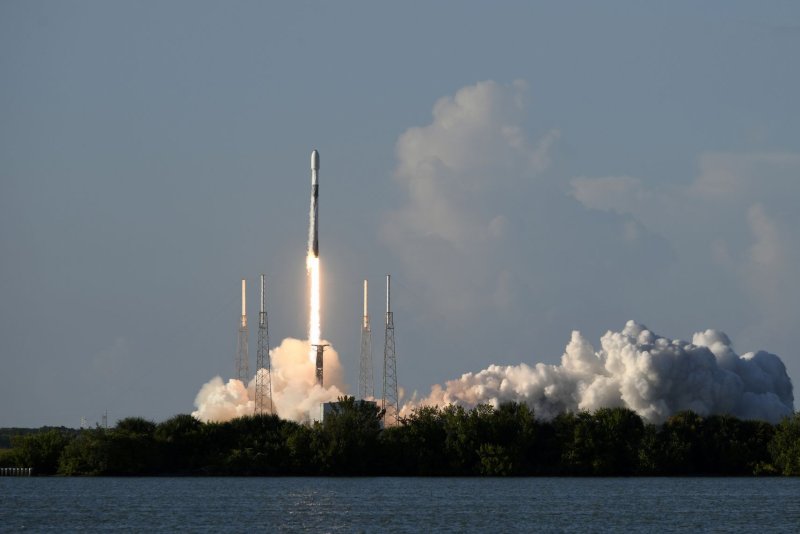1 of 3 | A SpaceX Falcon 9 rocket launches the Korea Pathfinder Lunar Orbiter (KPLO) PM from the Cape Canaveral Space Force Station, Florida at 7:08 p.m. on Thursday. Photo by Joe Marino/UPI |
License Photo
Aug. 4 (UPI) -- Florida's Space Coast on Thursday was busier than it's been in decades, launching two separate rockets on the same day for the first time since the heyday of the Space Race.
SpaceX's Falcon 9 rocket launched at 7:09 p.m. EDT hauling the Danuri, which is South Korea's first lunar mission Space Launch Complex 40 at Cape Canaveral Space Force Station.
The Falcon 9's first stage landed on the Just Read the Instructions droneship at 7:20 p.m. and the orbiter was deployed at 7:50 p.m.
The orbiter, named with a combination of the Korean words for "moon" and "enjoy," will take about four months to arrive in orbit around the moon, where it will search for water and research the moon's magnetism.
The launch had been delayed because NASA asked South Korea to load some heavy photography equipment onto the probe in order to research the dark side of the moon, The Hankyoreh reported.
There were also rumors the lunar probe was carrying music by the K-pop boy band BTS, the Korean newspaper said. Researchers said they're conducting experiments on how to transmit music to Earth from space.
First up on Thursday was United Launch Alliance, which sent the Atlas V rocket off around 6:30 a.m. EDT, carrying a missile-warning satellite for the U.S. Space Force, from Space Launch Complex 41 at Cape Canaveral Space Force Station.
That launch had been delayed twice, but successfully lifted off with Space-Based Infrared System Geosynchronous Earth Orbit Flight 6 satellite in tow.
"Equipped with powerful scanning and staring infrared surveillance sensors to protect our nation 24/7, the SBIRS spacecraft continue to serve as the tip of the spear for global missile warning as ballistic missile threats proliferate around the world," ULA said.
A third launch also happened on Thursday, as Blue Origin sent its sixth private human spaceflight from West Texas.
The company's New Shepard N-22 mission carries six passengers in a space-tourism flight.
Busy space coast
The last time the launchpads at Cape Canaveral were working at this rate, it was some 60 years ago, during the Cold War-fueled Space Race.
In one particular day in March 1966, just months before the July 21 moonwalk, Neil Armstrong and a team of astronauts aboard the spacecrafts Agena and Gemini launched into space less than two hours apart, both from Cape Canaveral.
Space Force officials say the pace of launches has picked up recently.
"Just a few years ago, they were launching maybe 12 rockets in a year -- we've got about 60 plus on the manifest to finish out this year and there are hopes of possibly doing up to 100 launches next year," U.S. Space Force 2nd Lt. Christian Jackson told Spectrum News 13.
"So, if we want to reach those numbers, we're definitely going to get to that point where we're launching over one in a day," Jackson said.
Just last month, SpaceX broke its own records by reaching 33 successful launches in the same year, up from 31. In its latest launch, on July 24, the company sent 53 Starlink satellites into low-Earth orbit from the Kennedy Space Center in Florida.
And just before that, SpaceX launched an unprecedented three missions in the span of 36 hours.
As far as Cape Canaveral goes, it should only get busier.
"It's super exciting because we finally get to prove our capability," Jackson said. "It's something that we train for every week.
"We're constantly looking to the future. Gen. Purdy definitely pushes us to be the range of the future, having the Cape operate much like an airport would."















